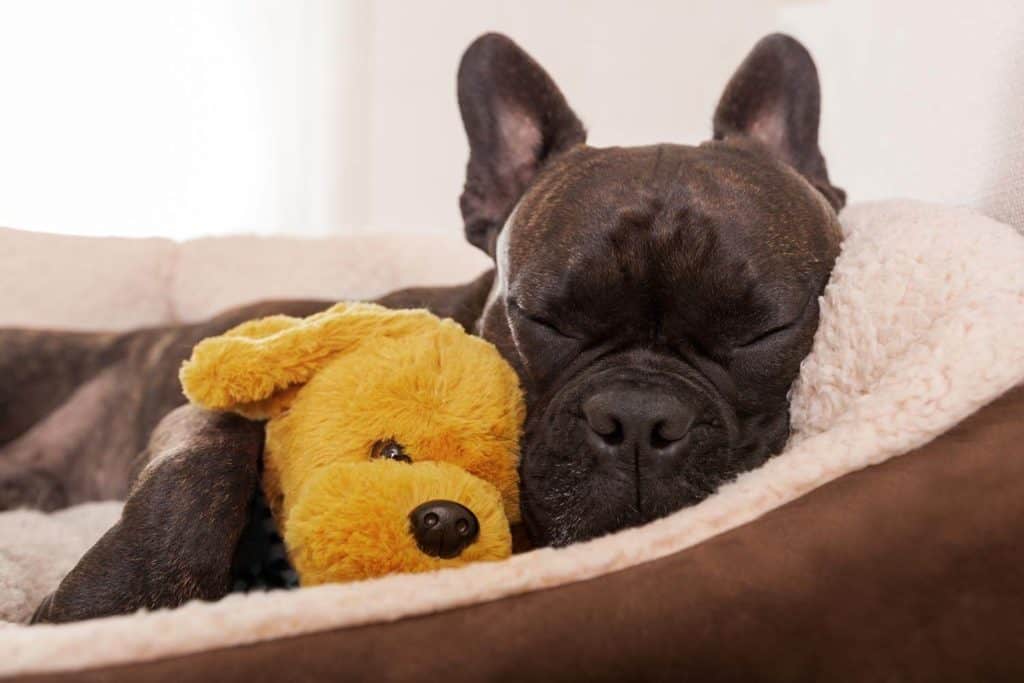
French bulldogs are adorable companion dogs that love spending their days curled up in a corner asleep. They generally have a calm and relaxed temperament, and just like most dogs, they spend most time of the day sleeping or napping than they do awake, especially after a long active day of play. Although this is perfectly normal, there are several factors worth noting that contribute to the amount of your dog’s sleep.
So how many hours do French bulldogs sleep? They need about 12 to 14 hours of sleep daily, and it often extends to 18 to 20 hours of sleep per day, depending on your pet’s day to day routine. That’s more than the average time humans need.
They also spend a few hours awake and enjoy laid back activities such as taking short walks and accompanying their owners in the house with the family or outdoors playing with other dogs. Many owners report that their Frenchies tend to have a lower to moderate state of activity even when they are awake. On average, a Frenchie spends 50% of the day sleeping, 20% of the day doing any kind of activity, and spends the last 30% awake but in a more relaxed, less active state.
These Frenchies are known to be prone to several health issues and getting enough snooze is very important. Their sleep patterns can easily be affected by their environment, such as the sound inside the room, as well as the age of your Frenchie. If you notice any significant changes in your Frenchie’s sleeping habits these might be the cause of the following factors:
Adult VS. Puppy – How Much do French Bulldogs Sleep
How much do adult French Bulldogs sleep?
Adult Frenchies tend to require an average time of sleep of 12 to 14 hours. You may notice an increase in their sleeping habits such as afternoon naps as they enter seniorhood; your dog might require more frequent naps throughout the day.
How much do French Bulldog puppies sleep?
Frenchie puppies require more sleep than adults, on average 18 to 20 hours. Expect a Frenchie puppy to sleep throughout the day more than the usual especially if it’s only a few weeks old. A daily routine established with some light playtime and regular eating time would work to ease well to keep your puppy healthy.
Your French Bulldog’s physical and emotional health
Assessing your Frenchie’s physical health
Frenchie’s sleeping pattern could be highly affected by its physical health. French bulldogs have a strong compact body that needs to be maintained with regular exercise. A moderate activity could easily help improve your dog’s joint and muscular health as well as its sleep. However, you also need to watch out for health complications that are known to Frenchies. These include difficulty in breathing or irregular breathing such as Brachycephalic Short Head Airway Syndrome common to flat faced-dogs. Symptoms of physical pain that could affect sleep include the following:
- Obesity
- Apnea
- Metabolic disease
- Stiffness and limping
- Shaking and trembling
- Changes in body posture
- Slow-moving after getting up
Assessing your Frenchie’s emotional health
Changes in mood and emotional health could also affect your Frenchie’s sleeping patterns. Often the signs of a Frenchie oversleeping or having difficulty in sleeping might be related to some factors involving emotional health. Generally, the French Bulldog has an even temperament and likes to socialize. If you notice some signs of aggression or irritability it might be a concern that could result in poor sleep. Common symptoms of poor emotional health and anxiety among Frenchies include the following:
- Pacing forward and back in the room
- Excessive Barking
- Repetitive Compulsive Behavior
- Destroying toys and furniture
- Display of aggression toward other dogs
Stress and pressure from life events
Major life events can shake up a routine and create some stress and pressure for your Frenchie. It may affect your Frenchie’s ability to respond and interact and oftentimes can cause restlessness and separation anxiety that can lead to a change in sleep pattern. Expect to notice a change in your Frenchie’s sleep routine when the following life events occur:
- A change in owner’s schedule
- A death in the family
- A close companion moving away
- Chang in the owner’s schedule
- Arrival of a new member in the family
If you notice your Frenchie is sleeping a little too much with low energy, and is exhibiting one of these symptoms such as : having low energy, lethargy, or illness symptoms, it might be time to consult your local veterinarian to provide your with some best-medicated options
Aid your French Bulldog have a better sleep
French Bulldogs are a small, compact, and muscular breed; however, due to their genetics and uniquely shaped cranium, they are prone to health issues that can very much affect their sleeping pattern. Help your Frenchie have better sleep and overall health by following these tips:
Get active with your French Bulldog
Frenchies are a less active breed, which makes them great apartment dogs, but they do need their regular amount of exercise. Take your Frenchie for a short walk to experience the calming effects of nature. Your Frenchie will also love playing with other dogs at the local dog park because it’s a friendly breed. Regular exercise will help build the exact muscles that help reduce the discomfort of breathing disorders common to French bulldogs such as snoring and apnea. Some activities you can introduce to your Frenchie include the following:
- Fetching toys
- Playing at the park
- Learning new tricks
- Treadmill
Remove irritants with a humidifier
Humidifiers are a great help for dogs who have trouble breathing. Humidifiers help remove irritants in the room that block the breathing such as dust, molds, and other allergens. It can also aid to create moisture in the room by balancing the humidity which will help create moisture along your dog’s nasal passages to give your Frenchie a good night’s rest.
Find a comfortable sleeping position for your French Bulldog
Changing your Frenchie’s sleeping position may also aid in breathing problems caused by apnea of obesity. Find a position where your comfy in. You may opt to sit beside your Frenchie during sleep and manually adjust the pillow or cushion of its dog bed until you find a comfortable position where it’s snoring is lessened. Try a position where the head is slightly lifted higher than the body or add some extra padding on the dog bed to improve your Frenchie’s sleep quality.

FAQ (Frequently Asked Questions) on French Bulldog Sleep
Q: Do French bulldogs sleep through the night?
A: Most owners notice that their Frenchie companions sleep when they want. So yes, French bulldogs sleep through the night and would enjoy snoozing with the company of their owner. There’s no need to worry about your dog sleeping throughout the day and not getting enough sleep at night. Frenchies just love to sleep!
Q: Why does my Frenchie sleep so much?
A: French Bulldogs are flexible sleepers. They can easily adapt a sleeping routine almost anytime throughout the day. A full-grown Frenchie might spend less time sleeping than a puppy depending on its tiredness or level of activity, but they typically sleep from 12 to 14 hours a day. Pay attention to how your Frenchie responds to his ordinary routine. A calm and happy Frenchie around its owner is a good sign but if your dog is slow to stand up or doesn’t perk up to its usual morning walk then it might be good to take a look if there are some symptoms of physical pain.
Q: Where should a French bulldog sleep?
A: Find a nice cool and comfortable spot where your Frenchie can sleep. Make sure it’s away from any noisy areas around the house because they can be easily woken up.
Q: Should I let my French bulldog sleep with me?
A: Frenchies are known to develop separation anxiety. Having your dog sleep with you could often create a routine that he will look for in the long run. This might lead to crying and restlessness. It’s alright to have your pet snuggle with you every now and then. They are affectionate breeds that love human companionship after all, but try to establish a sleeping routine and sleeping place that your Frenchie can go to, especially when you are not around.
Q: What is the best bed for a French bulldog?
A: There are a lot of available dog beds on the market that can suit your budget and your dog’s needs. Look for one that has a sturdy and roomy crate. It would also be great to invest in ones with cooling technology to prevent your dog from experiencing overheat symptoms during the warmer months.
Q: Why does my French bulldog have low energy?
A: The French bulldog’s body has irregularly shaped structure just like most bulldog breeds which makes them difficult to breath because of this they tend to enjoy mellow and light activity the best. They also have small bodies which have a stocky compact figure because of this they also generally tend to conserve as much energy as they can. Their bodies have adapted to a slower-paced rhythm than most active dog breeds. This makes them great companions or lap dogs; however, if you notice unusual sluggishness it would be best to consult your local veterinarian.
Q: Why is my French bulldog sleeping with its tongue out?
A: There should be nothing to worry about. This is pretty normal for a Frenchie that loves to snooze often heavily drooling with their tongue out. Regularly check if your Frenchie can put its tongue back in once it has woken up from its sleep. If your Frenchie isn’t able to do so then it might indicate some jaw injury or some other symptom.
Q: Why does my French bulldog have rapid breathing in his sleep?
A: Rapid breathing is common for Frenchies. This is often related to their air passages and snout being more constrained than other breeds. This causes them to breathe in a short and shallow manner.
Q: Why does my French bulldog sleep with its eyes open?
A: This is perfectly normal, some studies on Frenchies show that this could be a defense mechanism to keep potential predators away from them. It could also be that its eyes are rolled back and half-open because of the position of its body.
